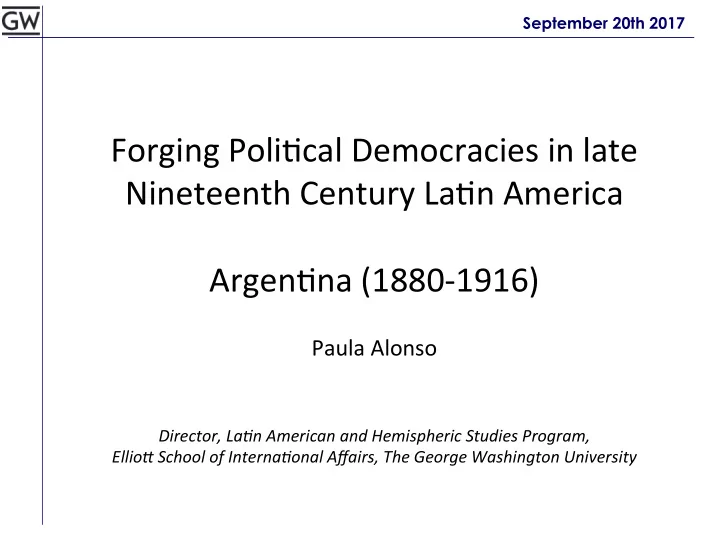

September 20th 2017 Forging Poli*cal Democracies in late Nineteenth Century La*n America Argen*na (1880-1916) Paula Alonso Director, La,n American and Hemispheric Studies Program, Ellio; School of Interna,onal Affairs, The George Washington University
Today’s talk • Nineteenth Century Poli*cal History − How is the field defined today? • Old and new ways of looking at the 19 th century • Argen*na − The Nineteenth Century − Modern Argen*na − Forging Democracy
Political History: How is the field defined today? - Pierre Rosanvallon, “The Study of Poli*cs in History”. Socie*es are organized following a body of principles, which is what shapes the poli*cal organiza*on. Poli*cs is part of the poli*cal, as it is about the procedures that are put in place. But the poli*cal world is not reduced to that, because it is also about how society is shaped, how ideas are contested, how the economy is impacted and impacts these procedures. Samuel Moyn (ed.), Democracy Past and Future , Columbia University Press, 2006.
Old and New Ways of Looking at the Nineteenth Century • The tradi*onal view (John Lynch) • Challenges: ü Liberalism ü Cons*tu*onalism ü Republicanism • New Emphasis in River-Plate/Argen*na • Fragile Viceroyalty • Autonomous provinces un*l 1852 • Na*onal (Dis)Organiza*on (1862-1880) • Oligarchy? 1880-1916
Modern Argen*na 1880-1916 • Economic Growth - Average Annual Rate 5% (1880-1914) - 30% of all La*n American Exports (with only 10% of the popula*on) - Foreign Investment • Demographics - European Immigra*on (6 million between 1856 and 1930). - Educa*on (1884 Compulsory Elementary Educa*on)
Railways in 1880
Railways in 1910
Modern Argen*na 1880-1916 • State-Building - 1880 Buenos Aires became the Federal Capital. -Provincial mili*as were disbanded. Na*onal Army. -Na*onal Currency- Peso. -Compulsory Na*onal Elementary Educa*on (1884). -Spanish became the official Language (1887). • Poli*cal Changes - Par*do Autonomista Nacional (PAN), 1880-1916 - Radical Civic Union (1891) - Socialist Party (1896)
] Forging Democracy before 1912? • Poli*cal Par*es - Radical Civic Union - PAN - Socialist Party • Poli*cal Press - Hybrids between pamphlets and newspapers - Freedom of the Press - Ideological Bagles. • Electoral World - Par*cipatory - Compe**ve • Social and Poli*cal Elites
Turnout in Buenos Aires, 1890-1910 Votantes (eje izquierdo) Población (eje derecho) 35000 1400000 Población Total en miles 1300000 30000 Votantes en miles 1200000 25000 1100000 20000 1000000 900000 15000 800000 10000 700000 5000 600000 0 500000 Elecciones Source: Paula Alonso, Voting in Buenos Aires, Argentina, before 1912”,in Eduardo Posada-Carbó, (editor), Elections before Democracy. The History of Elections in Europe and Latin America , Macmillan Press, Institute of Latin American Studies, University of London, 1996.
Electoral Compe**on, Buenos Aires, 1890-1898 120% 100% 80% % of the vote 60% [graph/figure/table here] 40% 20% 0% 1890 1891 1892:1 1892:2 1893 1894 1895:1 1895:2 1896 1898 Year UCR UC PAN PAN/UCN UCN Source: Paula Alonso“Poli*cs and Elec*ons in Buenos Aires, 1890-1898. The Performance of the Radical Party”, Journal of La,n American Studies , 25, 3, 1993
Conclusions ü Poli*cal Par*es (UCR-PAN) ü Poli*cal Mobiliza*on Con*nued under the PAN ü Elec*ons became the only means to legi*mize rulers ü Vo*ng increased at fast rates before 1912 ü The electoral calendar was respected ü Revolts con*nued but the concept of “ci*zens in arms” faded ü Poli*cal Press was free and vibrant ü Poli*cal opposi*on was exercised through different means ü Poli*cal Elites/Social Elites
Bibliography • Jeremy Adelman, “Liberalism and Cons*tu*onalism in La*n America in the 19 th Century”, History Compass , 12/6 (2014): 508–516. • Paula Alonso, Between Revolu,on and the Ballot Box. The Origins of the Argen,ne Radical Party in the 1890s , (Cambridge, Cambridge University Press, 2000). • Samuel L. Baily, Immigrants in the Lands of Promise. Italians in Buenos Aires and New York City, 1870-1914 , Cornell University Press, 1999. • Leslie Bethell, Argen,na since Independence , Cambridge University Press, 1993, Chaps by R. Cortés Conde and Ezequiel Gallo. • Roy Hora, The Landowners of the Argen,ne Pampas. A Social and Poli,cal History , Oxford University Press, 2001. • Eduardo Posada-Carbó, (editor), Elec,ons before Democracy. The History of Elec,ons in Europe and La,n America , Macmillan Press, Ins*tute of La*n American Studies, University of London, Londres, 1996 • Pierre Rosanvallon, Democracy Past and Future , (Samuel Moyn ed.) Columbia University Press, 2006, Part 1. • Hilda Sabato, “On Poli*cal Ci*zenship in Nineteenth Century La*n America”, The American Historical Review , 2001, Vol. 106, pp. 1290-1315. • Eduardo Zimmermann, “Racial Ideas and Social Reform: Argen*na, 1890-1916, The Hispanic American Historical Review , Vol. 72, N. 1 (Feb., 1992), pp. 23-46.
Recommend
More recommend